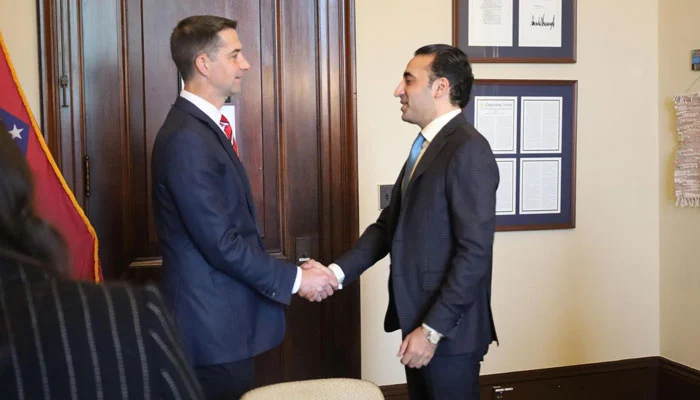Bilawal says India’s suspension of water treaty “declaration of war”.
Solution to Kashmir issue is in interest of all of us, lawmakers told.
Ex-foreign minister urges US to “support us in this peace mission”.
In a series of high-stakes discussions with members of the US House of Representatives Foreign Affairs Committee on Friday , former foreign minister and Pakistan Peoples Party (PPP) Chairman Bilawal Bhutto-Zardari cautioned about India’s increasingly aggressive stance and its potential to destabilise South Asia.
He urged American lawmakers to support Pakistan’s “mission of peace” and facilitate dialogue to avert a full-scale conflict in the region.
Leading a high-level Pakistani delegation, Bilawal engaged in extensive discussions on the current regional situation, the longstanding Kashmir issue, and the broader spectrum of US-Pakistan relations.
The Bilawal-led high-level diplomatic delegation has met various US lawmakers and held a series of significant meetings with members of the US Congress on Capitol Hill to present Pakistan’s stance and highlight New Delhi’s provocations and aggression against Islamabad.
Members of the parliamentary delegation include Hina Rabbani Khar, Sherry Rehman, Dr Musadik Malik, Khurram Dastgir Khan, Jalil Abbas Jilani, Tehmina Janjua, Bushra Anjum Butt and Syed Faisal Subzwari.
The delegation’s recent series of meetings with US lawmakers and diplomats come as part of Pakistan’s diplomatic outreach initiative in the aftermath of the recent armed confrontation with India.
Last month, both nuclear-armed neighbours carried out cross-border attacks against each other in the aftermath of the Pahalgam incident — wherein 26 tourists were killed in IIOJK — after which New Delhi launched airstrikes inside Pakistan prompting the latter to retaliate via Operation Bunyan-um-Marsoos.
After at least 87 hours, the war between the two nuclear-armed nations ended on May 10 with a ceasefire agreement brokered by the United States.
In the delegation’s latest meetings, Bilawal briefed the US delegation, which included Congressmen Jack Bergman, Tom Suozzi, Ryan Zinke, Maxine Waters, Al Green, Jonathan Jackson, Hank Johnson, Stacey Plaskett, Brian Mast, Brad Sherman, Greggory Meeks, Henry Cuellar and Senator Tom Cotton, on Indian aggression.
A critical point of concern raised by the former foreign minister was India’s unilateral suspension of the Indus Waters Treaty.
He unequivocally branded this move a “violation of international law,” saying that “India is setting a dangerous precedent of using water resources as a weapon”.
“The suggestion of shutting off water for 240 million Pakistanis is an existential threat. If India takes this step, it will be tantamount to a declaration of war,” Bilawal warned.
Furthermore, while acknowledging and appreciating the “positive role of the US in reducing tensions between Pakistan and India” and its efforts in securing the recent ceasefire, Bilawal stressed that the ceasefire was “just a beginning.”
“South Asia, India and Pakistan, and indirectly the entire world, are more insecure today than when this crisis began,” he stressed.
He further warned that “the threshold of full-scale war between Pakistan and India has never been so low in our history,” highlighting a dangerous trend where “any incident of terrorism anywhere in India, whether proven or not, is considered to mean war.”
Underscoring the urgency of the situation, Bilawal informed US lawmakers that Prime Minister Shehbaz Sharif had entrusted his delegation with a “mission of peace.”
This mission, he explained, aims to “find solutions to problems through dialogue and diplomacy with India.” He urged American lawmakers to “continue their efforts to establish peace and stability in South Asia” and to “support us in this peace mission.”
“If America puts its strength behind peace, it can convince India that solving our problems is the right thing to do,” Bilawal said, emphasising that “a solution to the Kashmir issue is in the interest of all of us.”
He called upon the US to “facilitate meaningful and constructive dialogue between Pakistan and India” and to “prevent India from pursuing policies that will destabilise the region and the world.”
Pakistan’s Ambassador to the US, Rizwan Saeed Sheikh, concluded the meeting by extending his gratitude to the American lawmakers.
Separately, speaking at a presser Senator Sherry Rehman, who is also part of the Bilawal-led parliamentary delegation, said that the recent 87-hour war was merely a trailer which was in fact a manifestation of Pakistan’s coordinated response.
“This war was part of India’s strategy to keep the region in a Bollywood-style tension,” she remarked, adding that Indian media was promoting war sentiments by limiting the peace narrative.
Terming Pakistan’s military response to Indian aggression as legal and limited, Rehman warned that any misunderstanding or mistake between two nuclear powers can result in immediate disaster for millions.
“A nuclear conflict in a densely populated and sensitive region like South Asia would be uncontrollable,” said Senator Rehman.
Expressing gratitude to the US for its intervention and mediation efforts to broker a ceasefire, Rehman warned that if there was no purposeful and principled negotiation process, this trailer could soon turn into a global tragedy.
“A solution to the Kashmir issue is possible in a serious and multilateral negotiation framework [….] India neither recognises multilateralism nor takes bilateral negotiations seriously and also refuses third-party mediation, which is necessary for any serious process,” she lamented.

